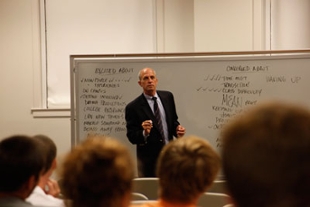Learning Before Classes Begin
JMU News
They unloaded packed cars, met their roommate, slept the first night in their new bed and now, on their first full day of James Madison University's orientation, students were ready to learn during Preface @ JMU, an intellectual introduction to the university’s academic culture.
This year the articles centered on the theme "Ways of Knowing," which challenged students to think about what they know and what they don't know and, most importantly, how to be successful in a new environment for which they may or may not be prepared. Tasked with reading four articles, writing a reflection paper and coming to orientation prepared to talk about their thoughts, the first-year students filed into rooms across campus to meet faculty and staff members ready to propel them into thinking like a college student.
The Preface readings are chosen by a small group of faculty to mimic a typical amount of reading expected from a professor per class. The Preface session is to teach students that college-level classes are very different from high school. Kristin Muncy, associate director in the office of student activities and involvement, told the students that in the class she teaches up to 50 percent of the student grade is based on participation. "Today is a kind of pretend classroom," said Muncy. "This is your chance to practice participation, share your thoughts and ask questions."
Alicia Davis of Richmond, Va., said, "I really enjoyed it. It's so good to get to know the thoughts and opinions of people living around you." Students pointed to the benefits of connecting with a faculty member and with each other on an academic level.
"Preface got me excited to be a part of academics at JMU," said Kyle Neilson of Charlottesville, Va., whose group attended the session taught by Michael Moghtader, associate professor of writing, rhetoric and technical communication.
"Preface was fabulous," said Ed Brantmeier, a faculty member in the College of Education and the assistant director of the Center for Faculty Innovation. "My students were extremely motivated."
Brantmeier said that while most of his group felt prepared, they are still anxious to start college. The students in Muncy's group freely talked about their worries: getting behind academically, the type of work, changing majors, getting involved and solving problems without their parents' help. Muncy emphasized that in college "you have to figure out your resources and you have to make the effort to create a relationship with your professor."
Based on this first interaction with faculty, Neilson does not think engaging with his teachers will be a problem. "Professors here want to help you learn and grow as a person," he said.
"Ways of Knowing" Preface Articles:
The Anosognosic's Dilemma: Something's Wrong, but You'll Never Know What It Is, Errol Morris, New York Times, June 20, 2010
In this reading, a reporter discusses the perplexing problem of how humans don't know what they don't know with a social psychologist who studies this issue. Have you ever been the "victim" of your own ignorance? Is there knowledge we can't attain? How can we know? As you read this article, consider what you know about being a university student. How did you arrive at that knowledge? What do you think you still need to learn on that subject?
Five Minds for the Future, Dr. Howard Gardner
Gardner helps us think about the different "minds" our culture and the world will need in the coming years. Pay some attention to the discussion about subject matter versus disciplinary thinking.
Most Likely to Succeed: How do we hire when we can't tell who is right for the job? Malcolm Gladwell, New Yorker, December 15, 2008
Gladwell considers the problem of making a decision with inadequate or even the wrong information in hand. He considers what predictive behaviors we might look for when selecting a good teacher, or quarterback or financial analyst. You've come to JMU as a successful high-school student. Does that success translate to guaranteed success at college?
Thinking Twice: Education, Dr. Debra Satz and Dr. Eamonn Callan, Stanford University, School of Humanities and Science, December 2008
Satz and Callan look at a current "problem" through two different lenses or disciplinary areas of expertise. Note how they inform their writing in different "ways." Consider how different disciplines know. As you enter a major program one of the things you will be doing is learning how that discipline talks to its constituents/experts and to outsiders/novices.

